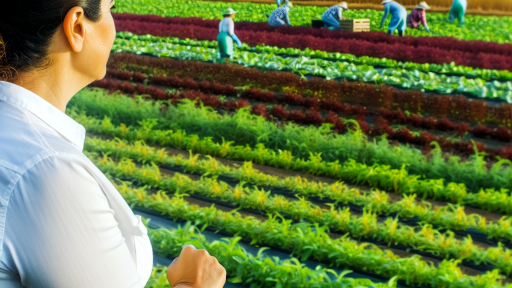Definition and Importance of Ethical Farming
What is Ethical Farming?
Ethical farming refers to agricultural practices that prioritize animal welfare and environmental sustainability.
This approach supports fair working conditions for laborers and respects local communities.
Farmers aim to minimize chemical usage while focusing on organic and regenerative practices.
Key Aspects of Ethical Farming
Transparency is a core principle in ethical farming.
Consumers deserve to know how their food is produced and sourced.
Traceability helps ensure that farming practices adhere to ethical standards.
Moreover, ethical farming promotes biodiversity through crop rotation and habitat preservation.
The Importance for Consumers
Consumers play a vital role in supporting ethical farming through their choices.
By choosing ethically sourced products, they encourage farmers to adopt better practices.
This creates a demand for sustainability and responsible farming methods.
Environmental Impact
Ethical farming helps combat climate change by reducing greenhouse gas emissions.
Farmers utilize sustainable land management practices, enhancing soil health over time.
This approach contributes to cleaner water sources and healthier ecosystems.
Social Responsibility
Ethical farming also emphasizes social responsibility within the agricultural sector.
Farm workers receive fair wages and safe working conditions.
Transform Your Agribusiness
Unlock your farm's potential with expert advice tailored to your needs. Get actionable steps that drive real results.
Get StartedBy supporting these practices, consumers can participate in creating a more equitable food system.
Consumer Choices Matter
Each purchase decision influences farming and production practices.
Choosing products with ethical certifications encourages more farmers to adopt these methods.
As a result, consumer awareness and engagement are crucial for the future of ethical farming.
Key Principles of Ethical Farming Practices
Animal Welfare
Ethical farming prioritizes the well-being of animals.
This includes providing adequate space and freedom for movement.
Farmers must ensure animals receive proper nutrition and care.
Additionally, ethical practices involve humane treatment during all processes.
Sustainable Resource Management
Sustainable farming systems focus on using resources wisely.
Farmers should practice crop rotation to maintain soil health.
Effective water management is essential in reducing waste.
Moreover, utilizing renewable energy helps minimize the carbon footprint.
Preserving Biodiversity
Ethical farming fosters diversity within agricultural systems.
Implementing organic farming methods promotes healthier ecosystems.
This approach supports a variety of plant and animal species.
Consequently, biodiversity enhances resilience against pests and diseases.
Support for Local Communities
Ethical farms often engage with local communities.
Supporting local economies is a key principle.
Farmers should source materials and labor locally whenever possible.
This creates jobs and strengthens community ties.
Transparency and Fair Trade
Transparency in farming practices is critical.
Consumers deserve to know the sources of their food.
Fair trade principles ensure equitable treatment of farmers.
Participating in fair trade promotes ethical sourcing of products.
Showcase Your Farming Business
Publish your professional farming services profile on our blog for a one-time fee of $200 and reach a dedicated audience of farmers and agribusiness owners.
Publish Your ProfileEducation and Advocacy
Educating consumers about ethical farming increases awareness.
Advocacy for sustainable practices encourages more farmers to adopt them.
Creating campaigns can highlight the benefits of ethical choices.
Ultimately, informed consumers make better choices for the planet.
Impact of Consumer Choices on Ethical Farming
Understanding Consumer Influence
Consumer choices directly affect farming practices.
When consumers demand ethical products, farmers respond accordingly.
This demand drives a shift towards sustainable practices.
Moreover, ethical consumerism fosters accountability within the agricultural sector.
Shaping Market Trends
Consumer preferences shape the market landscape significantly.
For instance, increased interest in organic foods leads to more organic farming.
As a result, farmers often switch to sustainable methods to meet this demand.
In turn, this shift enhances environmental stewardship across the industry.
Supporting Local Farmers
Choosing local foods directly supports nearby farmers.
This choice empowers communities economically and socially.
Additionally, it reduces carbon footprints associated with transportation.
Local farming often involves traditional methods that are more ethical.
Encouraging Sustainable Practices
Consumers who prioritize sustainability influence farming trends positively.
They create a market for ethically farmed and sustainably sourced products.
Consequently, farms are encouraged to adopt innovative, eco-friendly practices.
This, in turn, leads to improved animal welfare and biodiversity.
Challenges and Opportunities
While consumers drive change, challenges remain prevalent.
Adoption of ethical practices often involves higher operational costs.
However, the growing demand for ethical products presents opportunities.
Farmers can access new funding and grants to support sustainable initiatives.
Discover More: Reducing Farm Waste Through Sustainable Methods
Historical Context of Ethical Farming Movements
Origins of Ethical Farming
Ethical farming has deep roots that trace back to traditional agricultural practices.
Communities valued sustainable methods that respected the land and its resources.
In the early 20th century, organic farming began to emerge in response to industrial agriculture.
Pioneers like Sir Albert Howard promoted the importance of soil health and biodiversity.
Rise of the Organic Movement
By the 1960s, the organic movement gained traction globally.
Movements focused on avoiding synthetic chemicals and promoting natural farming processes.
Organizations like the Soil Association in the UK played a critical role in this growth.
They established certification systems that ensured organic standards were met.
Influence of the Environmental Movement
The 1970s brought increased awareness of environmental issues.
Books like “Silent Spring” by Rachel Carson galvanized public interest.
Consumers began to question the impacts of modern farming on ecosystems.
This shift led to a heightened interest in sustainable agriculture and ethical practices.
Development of Fair Trade Practices
In the late 20th century, fair trade practices emerged as a crucial aspect of ethical farming.
These initiatives aimed to ensure fair compensation for farmers in developing countries.
Organizations like Fairtrade International helped promote equitable trade standards.
Showcase Your Farming Business
Publish your professional farming services profile on our blog for a one-time fee of $200 and reach a dedicated audience of farmers and agribusiness owners.
Publish Your ProfileThe focus shifted to social justice, alongside environmental sustainability.
The Modern Ethical Farming Landscape
Today, ethical farming embraces diverse practices worldwide.
Consumers are more informed and demand transparency in food production.
Movements like regenerative agriculture further enhance the commitment to sustainable practices.
Ultimately, the evolution of ethical farming is shaped by social, environmental, and economic factors.
Delve into the Subject: Eco-Friendly Ethical Farming Strategies
Case Studies of Successful Ethical Farming Initiatives
Local Harvest Farms
Local Harvest Farms exemplifies a successful ethical farming model in rural Pennsylvania.
The farm prioritizes organic techniques and sustainable practices.
They promote soil health through crop rotation and cover cropping.
Furthermore, they engage in community-supported agriculture (CSA), fostering local ties.
As a result, consumers enjoy fresh produce while supporting local agriculture.
Green Leaf Organic Co-op
Green Leaf Organic Co-op operates across several states, providing organic products to urban communities.
This cooperative focuses on fair trade practices and transparency in their supply chain.
They ensure that farmers receive fair compensation for their crops.
The co-op also educates consumers about the importance of ethical sourcing.
Consequently, they have built a loyal customer base committed to supporting ethical farming.
Sunny Meadows Farm
Sunny Meadows Farm demonstrates the success of regenerative agriculture in the Midwest.
The farm implements practices that restore soil health and biodiversity.
They utilize holistic grazing methods and permaculture principles.
This approach increases productivity while reducing environmental impact.
Moreover, they host workshops to educate other farmers about regenerative practices.
Harvest Moon Community Garden
Harvest Moon Community Garden thrives in an urban setting, bringing together diverse community members.
The garden promotes food sovereignty and provides fresh produce to local residents.
They focus on sustainable practices and teach gardening skills.
Additionally, they collaborate with local schools to educate children about healthy eating.
This initiative creates a strong sense of community and empowers individuals.
Wildflower Farm
Wildflower Farm specializes in sustainable flower production in California.
They use organic methods and avoid chemical pesticides.
This not only benefits the environment but also enhances the quality of the blooms.
The farm emphasizes the importance of supporting pollinator populations.
As a result, they attract consumers interested in eco-friendly floral arrangements.
Learn More: Understanding CSA Subscription Models for Farms

Challenges Facing Ethical Farmers Today
Economic Pressures
Ethical farmers often struggle with lower profit margins.
High production costs limit their competitiveness.
Additionally, they face the challenge of competing against large-scale industrial farms.
These farms often prioritize profit over environmental sustainability.
This imbalance puts ethical farmers at a disadvantage.
Consumer Awareness
Many consumers lack awareness about the benefits of ethical farming.
This ignorance leads to a preference for cheaper, mass-produced goods.
Consequently, ethical farmers struggle to find a steady customer base.
Showcase Your Farming Business
Publish your professional farming services profile on our blog for a one-time fee of $200 and reach a dedicated audience of farmers and agribusiness owners.
Publish Your ProfileEducating consumers about the true costs of food production is essential.
Regulatory Challenges
Ethical farmers must navigate complex regulations.
Compliance with organic certifications can be costly.
Moreover, inconsistent regulations between regions complicate operations.
Farmers must adapt to changing policies that affect their practices.
Climate Change Impacts
Climate change poses significant challenges to farming practices.
Shifting weather patterns affect crop yields and livestock health.
Furthermore, increased frequency of extreme weather events disrupts operations.
Ethical farmers must adopt resilient strategies to cope with these changes.
Community Engagement
Building a supportive community is vital for ethical farming.
However, many farmers struggle to engage with their local communities.
Lack of resources often limits their outreach efforts.
Strengthening community ties can enhance support for ethical practices.
Gain More Insights: Local Food Systems And Sustainable Agriculture Growth
How to Identify Ethical Products While Shopping
Look for Certifications
Start by checking for ethical certifications on products.
Organizations like Fair Trade and USDA Organic provide assurance.
These labels indicate adherence to ethical labor and environmental practices.
Additionally, you can find certifications for humane treatment of animals.
Research Brands
Investigate brands before making a purchase.
Visit their websites to learn about their sourcing and labor practices.
Look for transparency in their supply chains.
Brands that openly share information tend to prioritize ethics.
Read Ingredient Lists
Examine product ingredient lists carefully.
Avoid products with harmful additives or non-sustainable ingredients.
Focus on those made from natural, organic sources.
This choice often reflects ethical farming practices.
Connect with Local Producers
Support local farmers by buying directly from them.
Participate in farmers’ markets whenever possible.
This can strengthen community ties and promote ethical practices.
Moreover, you get to know how your food is grown and harvested.
Utilize Mobile Apps
Consider using mobile apps designed for ethical shopping.
These apps provide information about products and brands.
They can help you make informed choices based on values.
Many apps allow you to scan barcodes for quick information.
Seek Environmentally Friendly Packaging
Look for products with minimal or recyclable packaging.
This choice reflects a brand’s commitment to sustainability.
Many companies now prioritize eco-friendly packaging solutions.
Choose products that align with your environmental values.
The Role of Certifications and Labels in Ethical Farming
Understanding Certifications
Certifications play a vital role in ethical farming practices.
They provide transparency and help consumers make informed choices.
Showcase Your Farming Business
Publish your professional farming services profile on our blog for a one-time fee of $200 and reach a dedicated audience of farmers and agribusiness owners.
Publish Your ProfileVarious organizations offer certifications tailored to unique farming methods.
These certifications often adhere to strict environmental and social standards.
Examples include USDA Organic, Fair Trade, and Rainforest Alliance.
The Impact on Consumer Choices
Labels influence consumer purchasing decisions significantly.
Many consumers prioritize products with ethical certifications.
This demand compels farmers to adopt sustainable practices.
Consequently, ethical farming becomes more financially viable.
Trustworthy labels forge a connection between consumers and producers.
The Challenge of Misleading Labels
Not all labels guarantee ethical practices.
Some brands use vague terms like “natural” without strict definitions.
Consumers must educate themselves to avoid falling for misleading labels.
Researching the certifications and their requirements is crucial.
This knowledge empowers consumers to support genuine ethical farming.
The Future of Ethical Certifications
The demand for ethically sourced products continues to grow.
As a result, more stringent standards may emerge in the future.
Organizations are likely to enhance their certification processes.
New labels may appear to address evolving consumer concerns.
Ultimately, consumer advocacy can drive positive changes in farming practices.
Additional Resources
Local Food Systems: Concepts, Impacts, and Issues, ERR 97, US …




